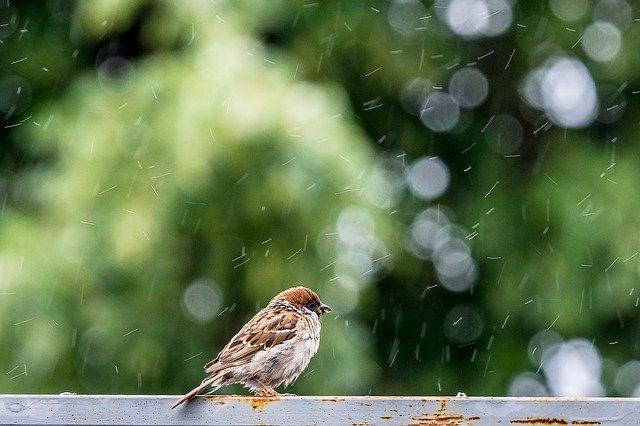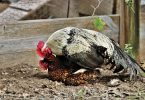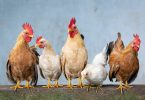Where do birds go when it rains or storms?
The weather seems to be getting worse everywhere – droughts, floods, hurricanes. You may wonder how do birds live. Where do birds go when the weather is bad?
You may notice little or no bird activity when it rains. And the birds seem to disappear altogether during the storms and winds. Where did they go? How do they protect themselves?
Let’s find out.
Where do birds go when it rains?
During the rainy season many birds continue their normal activities. Birds are very active and need regular food even when there is little rain they continue to do their bird thing. They can do this because they have water proof feathers. Well, the feathers aren’t waterproof in themselves. Birds use their waterproof feathers through the act of preening.
Birds spend most of their time caring for their feathers. This is called preening. They use their bill to filter through their feathers and clean dirt and parasites. They are smooth and aligned with all small interlocking barbules that act like tiny zippers to hold the feathers together properly. This keeps the feathers well maintained and helps keep water out of the skin below.
There is a special preening gland (also called oil gland) below the tail in many species of birds. Its exact name is uropygial gland.
Birds wipe the moisture from the glands out of their crowns and bills then they apply it to the rest of the feathers. The preening “oil” makes the feathers shine and look like new. Well-maintained feathers repel water with its fine structure, so than any properties of the preening oil itself.
So during the rainy season the birds usually stay outside, find food and live their lives. They stay dry with their water-repellent feathers just as much as human do with umbrella. If the rain is too heavy, however, or accompanied by winds, then the birds need to find a place to stay. We discuss this next.
Can birds fly in the rain?
Yes, birds can fly in the rain. Large birds such as ducks, geese, swans, and gulls are often seen flying in the rain.
During the storm, however, it uses a lot of energy to fly. And it is difficult to get food and replenish their lost energy. So flying in stormy weather doesn’t help. Birds often find shelter from storms.
During spring migration the world’s young birds often migrate north at night during the rainy season following a warmer climate. If they encounter a cold, cloudy sky and strong winds from the north, they will quickly descend and remain until the wind turn to their favour.
A few reliable indicators I have examined suggest that birds do not fly in the rain due to low air pressure. Lower air pressure is suspected to have higher flight energy expenditure. That would not have been the case with the migratory birds that fly north in the spring with very warm fronts that are under pressure and rainy weather.
Migratory birds fly at high altitudes where air pressure is below ground level. But the birds also fly in the mountains when the air pressure is very low too.
Where do Seabirds go when it rains
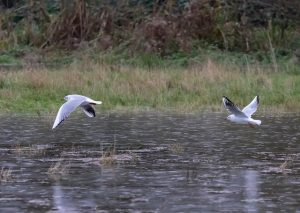
Larger seabirds can handle less rain. In fact, they do not want to allow the storm to distract them from continuing their day.
Small seabirds, on the other hand, are not followers of stormy weather. Their size makes it difficult for them to fly during stormy weather and they end up being in danger of being defeated by it.
They seek refuge on land but occasionally perch in some places like trees until the storm passes.
Sea birds produce oil through their preen glands that keeps their feathers water-repellent from the elements. So, when you see a home for seabirds, it comes from the unpredictability of the storm rather than the rain itself.
Where do land birds go when it rains
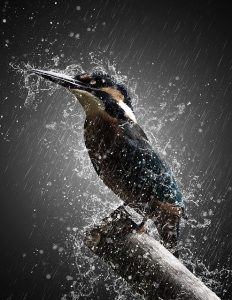
If it is just a little rain out there then both humans and birds have a tendency to keep going, we do not allow a small amount of rain to disturb our day as well as the birds of the earth.
As humans, we protect ourselves from rain with waterproof coats, while ground birds are protected, for their feathers shed the rain from their body and traps in air to keep them warm.
Earth’s birds remain motionless as much as possible, so they can help maintain their energy. Keeping warm uses a lot of their energy, so when the storm seems to not allow the birds to reach a point where they have no choice but to brave the conditions when they are looking for food.
Where do Song Birds go when it rains
When it rains the songbirds will seek refuge in the leaves and stay as long as possible to conserve energy. They sit up to face the wind, which reduces wind resistance and helps hold on to that vital body heat for a long time.
Where do insect birds go when it rains
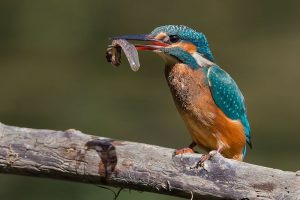
Insect birds such as robins and warblers are birds that live mainly on insects, when it is raining you can see these birds looking for nectar and insects trapped.
Insectivores needs a lot of energy to feed their body heat in the rain, so if you see them flying they are probably looking for food.
Where do Raptor birds go when it rains

If it is only a little rain this will not stop the raptors, as they know the weather will not affect their prey. But in the case of an heavy rain, raptors will seek shelter knowing that their prey too will also seek shelter.
Raptors are known for hunting, although doing so in the rain would be counterproductive and a waste of their energy.
Where do Water Birds go when it rains
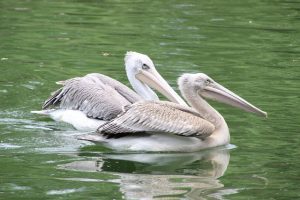
Water birds love water so definitely they love the rain too. After all, the saying “it’s a good weather for ducks,” should hold the truth in it.
Ducks love the rain and can be seen diving into water and start splashing here and there, many water birds feed on insects and worms, which are easily accessible in wet weather.
Ducks and swans can sleep in the water and on the ground, either in the sun or in the rain. Their feathers are waterproof and do not lose body heat as other non-aquatic birds.
However, ducklings do not like rain very much because their feathers are not completely waterproof yet. So heavy rain can quickly make them start shivering.
The Importance of Being on Time?
Birds know that a little rain can just turn into a big rain.
They can fly with speed on their side but they need to be prepared, as they do not want to be caught in a terrible weather unless they have no other option. Coping with rainfall and timing depends on the size of the bird and the severity of the weather.
Time and small Birds
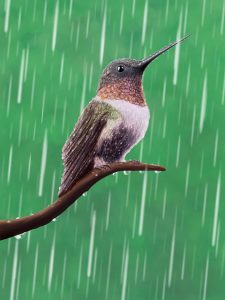
Smaller birds are not very good in the rain, because of their size they lose body temperature quickly and put themselves at risk of getting hypothermia.
As soon as it rains, the young birds often seek shelter in trees and shrubs as quickly as possible.
They will only go out in the rain if the storm doesn’t stop and they have no choice but to go out and look for food to regain their strength.
For young birds, it is about speed and intelligence. For them, it is not just a matter of rain and cold that is unpleasant to them, in the worst cases it can actually cost them their lives.
Time and the Big Birds
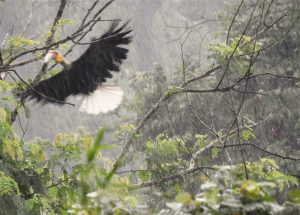
Large birds are not all affected by rain. They don’t have to worry about losing body heat quickly and some of them like to stay in the rain and use it to help clean their feathers.
And they need not worry about the rain affecting their balance like little birds, as they can withstand the rigid weather. Many large birds will avoid hunting in the rain because they know that their prey take shelter. These birds usually find shelter and wait for the storm. For them, the storm is more tedious than ever.
Heavy Rain and Small Birds
Smaller birds prefer to avoid heavy rainfall altogether but being thin is not so bad, as it means they can sneak into small, cozy spaces, such as buses and tree trunks to stay warm. If the bird has a nice, cozy place then it will stay warm and will not lose body heat.
They will have to consider going into storm conditions if the storm persists for a long time, as young birds have to feed often to maintain their maximum energy.
Heavy Rain and Big Birds
The great danger of large birds and exposure to rain is that it makes flying difficult for them.
Stormy weather can strike them along the way and obscure their view, and they are known for flying in buildings, trees, and windows. Bad weather is not very pleasant for any birds; except for water birds like ducks.
Frequently Asked Questions about where do birds go when it rains
Do you still have unanswered questions about where do birds go when it rains? Read on, as below I give answers to some of the most frequently asked questions.
Question 1: Can Birds Fly in Heavy Rain?
Birds have oily feathers so they can fly in heavy rain until it reaches a certain point and then maintain their flight.
Small birds cannot withstand heavy rain as not only do their wings fill with rain which makes it very difficult for them to function properly but also puts them at risk of getting hypothermia.
Larger birds do not have to worry too much about their wings or getting hypothermia, as their size makes them more resistant to heavy storm.
However, severe storms can make it difficult for large birds to see where they are going and this makes their movement very difficult for them.
Question 2: How do birds protect from themselves rain?
Smaller birds will try to take refuge in bad weather, they can stay for only a few hours as they need to be fed regularly.
If you see a small bird in the rain they will have their bodies upright and their mouths will point towards the rain, this position helps them to save as much energy as possible while allowing rain to fall on them.
As soon as the sun rises the birds will dry their feathers and dry them in the sun.
Question 3: Which Birds Are Waiting for Rain?
Robins, thrushes, and warblers can be seen roaming happily in storms, this is because the food they like to eat insects which is easy to find in wet weather.
They will eat before they finally find shelter to preserve their body temperature. For them the rain is the culmination of an ecstasy, which may explain why they always seem so light in the rain.
Water birds also like rain. Ducks spend a lot of time paddling in lakes and ponds so the rain does not bother them at all.
Question 4: Where do birds go during a storm?
They will seek refuge and try to wait for the storm. They will remain motionless to maintain body temperature, as soon as the storm is over they will come back and go searching for their next food.
Question 5: Where do birds go to in Windy Weather?
Small birds will hide until the bad weather passes, as their size makes it difficult for them to withstand strong winds.
Big birds fly straight into the storm, as the rising winds carry them up and down. A bird that climbs high allows a storm to lift up, which means they can conserve energy. The wind catches them but slows them down.
Question 6: Where do birds go in the snow?
As winter approaches the birds know that preparation is key. First, they will find suitable shelter. Birds may roam for miles around in search of a suitable shelter.
As soon as they notice a change in air pressure, they will begin to forage and eat more. Eating large quantities makes it much easier for birds to withstand cold temperatures.
Birds also have cold blood on their legs and feet, they lose very little heat with them. They also have thick feathers in the winter months that they melt when spring arrives. All this preparation means that as soon as the icy weather arrives, they are ready for it.
Question 7: Can Birds Predict Rain?
The birds seem to sense the approaching storms. This is mainly due to the change in atmospheric air pressure their middle ear receptor that allows them to sense.
Before the storm the birds have a habit of being quiet, just as the storm ends they reappear and they can be seen searching for food.
It is believed that seeing low-flying birds also means it will rain soon, while seeing high-flying birds means we can expect good weather.
Whether the birds can predict rain or not is really unknown. However, it has been proven that they are very much affected by the signs that bad weather is coming, just as nature tells them when to prepare for winter.
Question 8: How do birds handle hot weather?
During warm weather the birds pant to cool down, as this helps them absorb heat from their bodies. During warmer weather, you may see birds searching for food in the morning and in the afternoon, as these times to cool.
Birds may be small but very intelligent and know how to survive, regardless of the weather.

